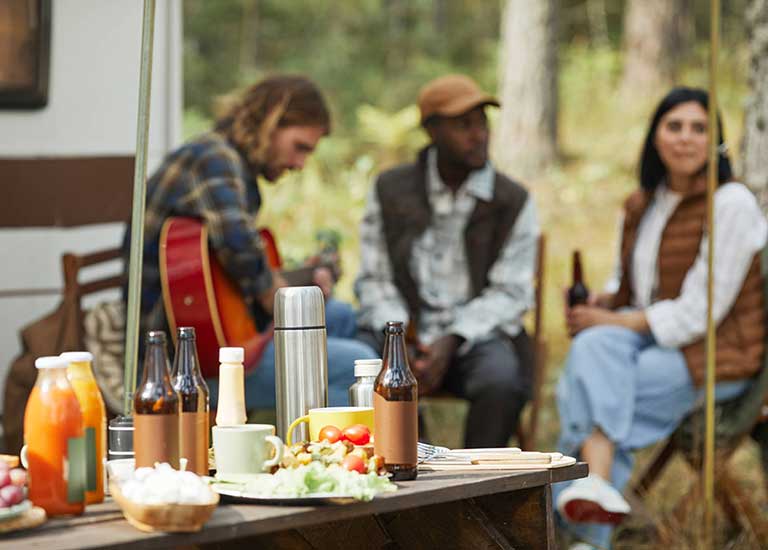Healthy food on the road

Anyone who shifts their vacation domicile to four wheels is not infrequently faced with the question of what dishes will be on the folding table in the coming days and weeks. Often the haute cuisine simply suffers from the lack of space. Whether motor home or van, the options for stowing, storing and preparing food are limited. However, that doesn't mean your culinary choices are limited to canned ravioli and tinned sausages. In this article, you'll find tips for healthy food on the road.
Since at the end of the day everything goes its natural course and what comes in at the top has to go out again elsewhere, it is always good to have your own toilet on board ;). Everything you need to know about the dry composting toilet can be found in our composting toilet article.
The culinary sausage case scenario

Out of the city, into the adventure of camping. Somewhere between the main road and the highway, you get a little hungry. Your second breakfast consists of a mini salami squeezed into a tight dough wrap. At noon your journey is stopped by a french fries barrier at the rest stop, to the conclusion of the evening there is a pizza at the fast food restaurant directly behind the last exit, which goes down thanks to cheese with double fat level, like oil. Arrived at the parking lot, the next days continue with a colorful potpourri of canned soups, spaghetti adventures and barbecue orgies.
The food on the road is sometimes as far from wholesome as a jello is from a crème brûlée. So far, so good, so hard to digest. At the latest, when the gastrointestinal tract protests loudly and the amount of litter in your Trelino® increases with each session, the thought creeps in that these culinary excursions are not a desirable permanent state. But it's not that hard to eat a healthy, balanced diet on the road.
What is part of a balanced, healthy diet on the road?

Whether in the kitchen at home or on the road: a balanced diet always includes a good balance of fiber, vitamins, carbohydrates, fats and, above all, fluids.
Even when you're on the road, you can follow the recommendations of the German Nutrition Society. This recommends a balanced diet rich in fresh fruit, vegetables, whole grains, lean protein, healthy fats and sufficient fluids.

The diet on the road should be varied to cover all nutrients. It is recommended to eat 5 servings of vegetables and fruits daily and whole grain products as the main source of carbohydrates. Lean meats, fish, legumes and dairy products provide adequate protein.
Healthy fats from nuts, seeds and oils are important. Adequate fluid intake, especially water, rounds out a balanced diet.
What should not be missing in your travel kitchen for healthy food on the road?

When you decide to explore the world on four wheels, you are consciously opting for a more minimalist form of travel. Accordingly, it's less likely to be your aspiration to prepare Duck à l'Orange. And between us, pastor's daughters: serving a 5-course meal in a van or motor home would have been a challenge even for Monsieur Bocuse. ;)
However, that doesn't mean you have to forgo healthy, tasty, and varied meals. The key is to defy the limited space while still being well-equipped. You can achieve this by having the following long-lasting food items as your onboard basics.
Foods rich in fiber
- Noodles
- Rice
- Couscous
- Bulgur
- Red lentils
- Oatmeal
- Muesli
- Crispbread, pumpernickel
Spicy helpers
- Spices (salt, bell pepper, paprika, Italian herb blends or herbs de Provence, etc.)
- Sugar
- (Balsamic) vinegar, (olive) oil
Liquid
- Water
- UHT milk or plant milk (oat, almond)
All-rounder from can
- Chickpeas
- Kidney beans
- Chopped or strained tomatoes
Snacks for in between
- Nuts
- Sunflower or pumpkin seeds
- Almonds
- Raisins
- Dried fruit
Fruits and Vegetables
- Apples
- Pears
- Onions
- Garlic
- Potatoes, Carrots (store in a cool and dark place if possible)
- Beets, Celeriac, Parsnips (in the refrigerator)
Food such as meat, fish, eggs, fruit and vegetables with short storage times should always be bought fresh on site and processed as quickly as possible.
The space in the refrigerator of your motor home is limited, especially in summer, the temperatures inside quickly exceed the fine line from cozy-warm to sweaty-hot. In this respect, the storage of these foods is a challenge.
Tips for the grill

Cooking in the open air gives you an additional feeling of freedom. It doesn't always have to be the sausage or the neck steak that ends up on the grill. Vegetarian alternatives are not only super tasty, but also super healthy! Peppers, eggplants or zucchini can be prepared excellently on the grill. Just like tofu, grilled cheese, fish or scampi.
Tips on camping food in general can be found in another article in our blog. In this sense: Bon Appétit!
Last but not least: How long does it actually take for food to be digested?

What comes around, goes around. Some foods we carry around longer, others our bodies part with more easily. Enjoying a hearty knuckle of pork before going to bed can make for a sleepless night in the roof tent. You toss and turn restlessly while your intestines work hard. If two people share the mattress, it is a sign of consideration to keep the story of the beans and tones in mind when choosing dinner.





Leave a comment